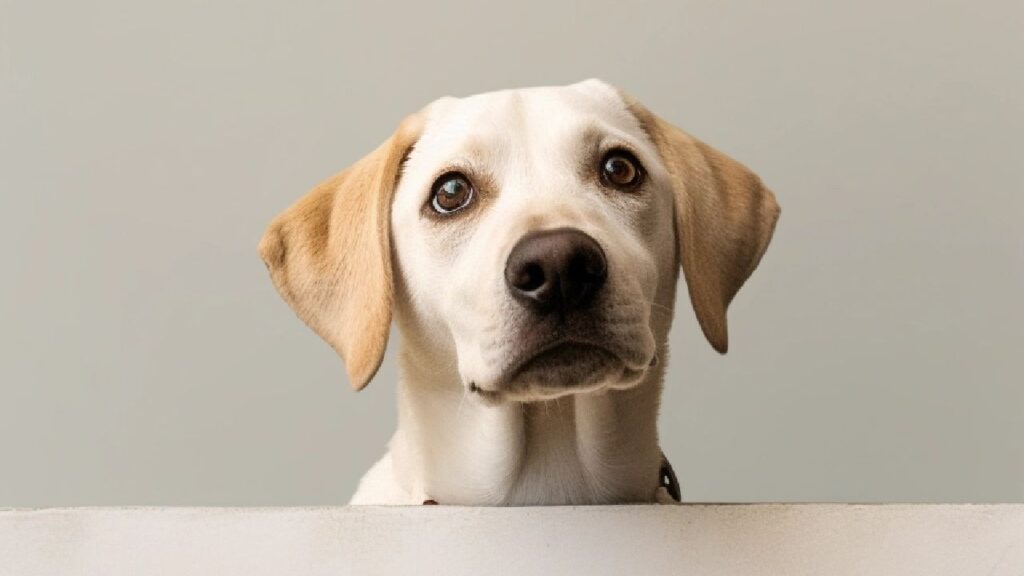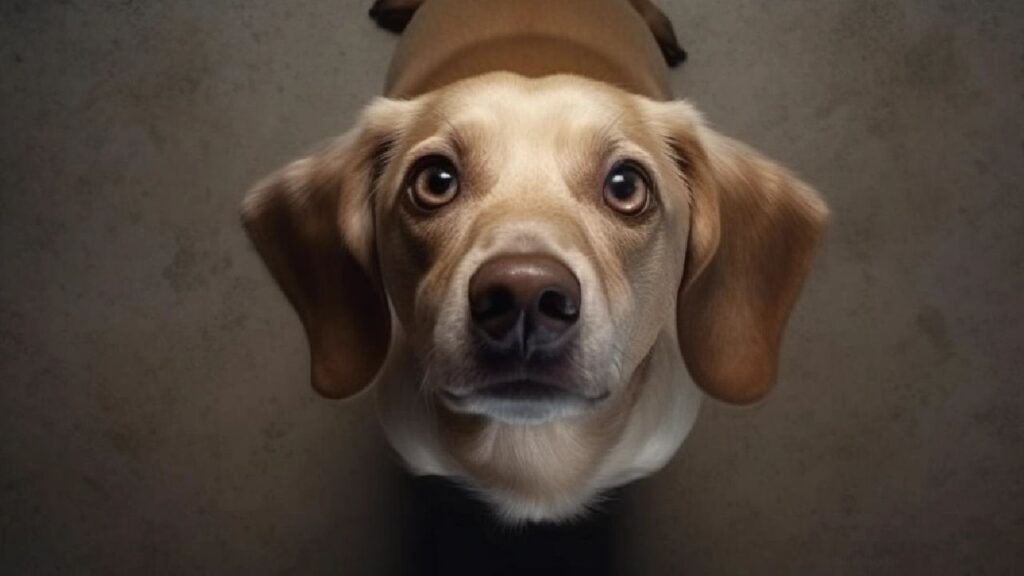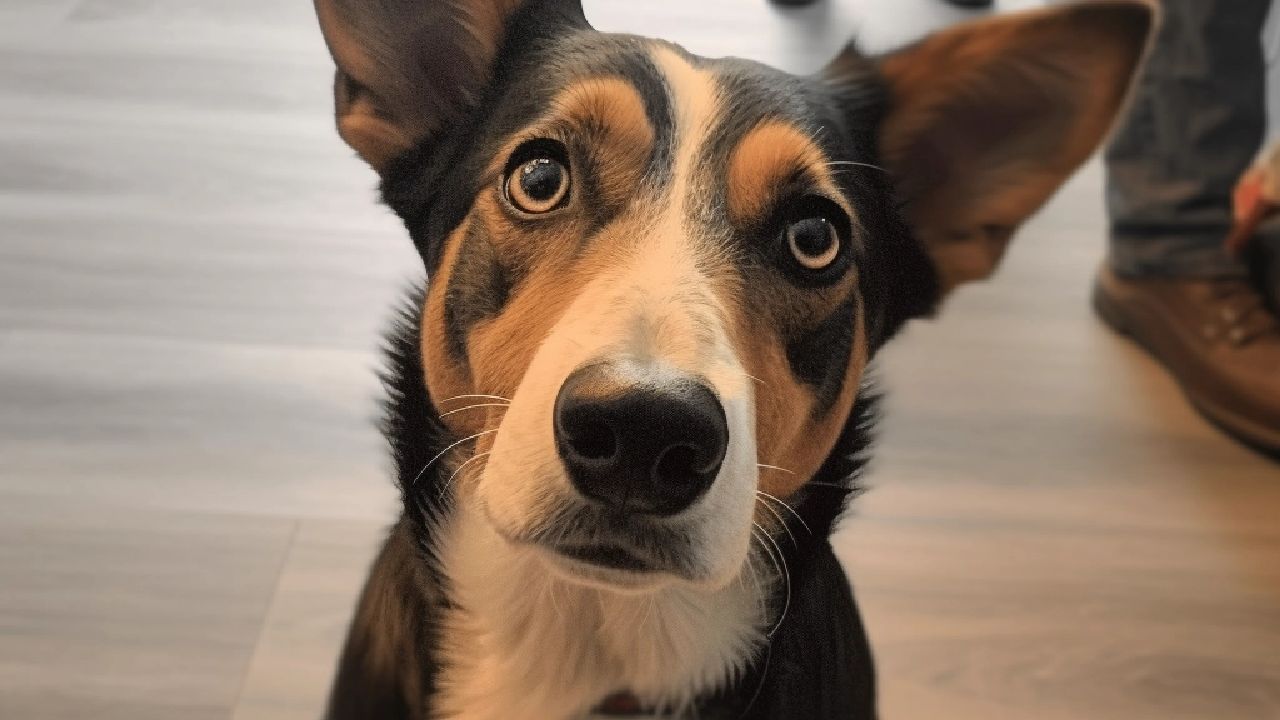When you welcome a dog into your life, you become part of a unique dance of communication. One behavior that stands out is how your furry friend looks into your eyes, conveying deep emotions and meanings. Understanding these messages can strengthen your bond with your four-legged companion and explain why your dog stares at you.
Understanding The Silent Stares of Canine Communication
You’re not alone if you’ve ever wondered, “Why does my dog stare at me?” This silent exchange is an essential form of canine communication, allowing them to express feelings and intentions without uttering a single sound.
Seeking Attention
One of the primary reasons your dog gazes into your eyes is to seek your attention. Those puppy eyes aren’t just cute; they’re a tool your dog uses to establish a connection with you.
When your dog stares at you, they invite interaction, play, or simply a moment of connection. This behavior harkens back to their ancestral roots when wolves and dogs relied on visual cues to coordinate actions and reinforce social bonds.
Expressing Affection
The adage “eyes are the windows to the soul” also holds for dogs. When your dog locks eyes with you, they’re expressing affection and attachment.
This is particularly evident in how they blink slowly while gazing at you, a behavior known as “doggy kisses.” This deliberate blink shows trust and comfort, showcasing their emotional connection with you.
Hoping for a Food Treat
If your dog stares at you with an unwavering gaze, it might not be just affection they’re after. Canines have an incredible ability to read human cues, and they’ve learned that staring can lead to rewards, especially in the form of treats. When your dog wants food, those hopeful eyes say, “I know you have something delicious, and I’d love to have a taste!”
Seeking Direction and Approval
Dogs are social animals that thrive on guidance and approval from their human companions. When your dog stares at you, they might seek cues to navigate their environment or interpret a situation.
This is especially common in new or unfamiliar settings where they need clarification on what to do. By locking eyes with you, they say, “What should I do next?” Your reactions and body language can give them the reassurance and guidance they need.
Emotional Mirror
Dogs are remarkably intuitive creatures, capable of picking up on your emotions even when you don’t explicitly express them. Your dog will likely mirror your emotional state when you feel happy, sad, stressed, or relaxed.

If your dog is staring at you when you’re feeling down, they’re attuned to your mood and might offer their silent support. Dogs have an uncanny ability to be emotional companions, using their gaze to communicate empathy and solidarity.
Strengthening the Bond
Your dog’s gaze isn’t just about their needs; it’s also about forging a connection that transcends verbal communication. When your dog looks at you, they acknowledge your presence, reinforcing their sense of companionship and security.
This shared gaze creates a powerful link that speaks volumes about the unique bond between humans and dogs, a bond built on trust, loyalty, and mutual understanding.
Curiosity and Observation
Dogs are naturally curious creatures and are often keen observers of their surroundings. When they stare at you, they’re trying to learn from you.
They watch your movements, expressions, and actions, picking up valuable cues about how things work in their human-dominated world. Your daily routines, gestures, and interactions give them insights into navigating their environment and coexisting harmoniously with you.
What Science Tells Us About Why Your Dog Stares At You
The Evolutionary Lens
To understand why your dog stares at you, it’s crucial to delve into the evolutionary journey that has shaped this behavior. The domestic dog’s lineage can be traced back to wolves, where intense eye contact was a vital form of communication within packs.
In wolf society, maintaining eye contact established dominance hierarchies and conveyed messages of submission or deference.
As dogs evolved from wolves to companions, their gaze transformed from a means of asserting dominance to a channel of bonding and communication. Through generations of selective breeding, dogs developed the ability to understand and respond to human expressions, fostering a unique interspecies relationship.
Oxytocin and the Human-Canine Connection
Behind the captivating gaze lies the remarkable hormone called oxytocin, often called the “love hormone.” Oxytocin is released in humans and dogs during positive interactions, including physical touch, play, and shared eye contact.
This hormone is pivotal in fostering emotional connections and strengthening the human-canine bond. Scientific studies have revealed that oxytocin levels increase in both species when humans and dogs engage in prolonged eye contact.
Recognizing When Staring Signals Discomfort
Signs Of Distress
While your dog’s stare often conveys positive emotions, it’s essential to recognize that staring can signal discomfort, stress, or anxiety. Stressed or anxious dogs might exhibit subtle signs such as lip licking, yawning, avoiding eye contact, or displaying a tense body posture.
When a dog’s gaze seems fixated or unwavering, it’s essential to assess the context and their overall body language to determine whether they’re experiencing distress.
Addressing the Issue Through Calming Techniques
Addressing the underlying issue is paramount if you suspect your dog’s stare is linked to stress or anxiety. Creating a calm and reassuring environment can help alleviate their discomfort. Here are some calming techniques to consider:
- Provide a Safe Space
Designate a quiet and comfortable area where your dog can retreat when feeling overwhelmed.
- Gentle Petting
Offer gentle and soothing physical touch to help them relax.
- Music and White Noise
Soft music or white noise can create a serene atmosphere that eases their anxiety.
- Professional Help
Consult a veterinarian or a professional dog behaviorist if your dog’s stress persists.

Tales of Stares and Stories Untold
Behind every stare lies a story, a unique narrative of shared experiences, unspoken emotions, and unforgettable moments. Real-life stories of dogs and their human companions offer a glimpse into the profound impact of those silent gazes.
Imagine the elderly dog who, with clouded eyes, still manages to lock onto your gaze, reminding you of the countless adventures you’ve shared. Picture the rescued pup who initially avoided eye contact, slowly learning to trust and express affection through their newfound confidence in gazing at you.
These stories reflect the extraordinary emotions and connections conveyed through a simple stare. They showcase the depth of understanding and empathy that dogs bring to their interactions with humans, reminding us of the beauty of unconditional companionship.
Conclusion
In conclusion, your dog’s gaze is a testament to the profound partnership between humans and canines. This connection transcends language and culture, reminding us of the precious gift it is. So, the next time your dog locks eyes with you, remember that you’re not just looking into their eyes; you’re peering into their heart and soul, strengthening the enduring friendship that makes every silent gaze truly unforgettable.

FAQs
Is prolonged eye contact a sign of aggression in dogs?
While prolonged and unbroken eye contact can be a sign of assertiveness or challenge among dogs, in the context of the human-canine relationship, it’s often a display of affection or connection.
My dog avoids eye contact sometimes. Is that normal?
Just as humans vary in their comfort level with eye contact, dogs have individual preferences, too. Avoiding direct eye contact could signify submission, respect, or personality.
Are there situations when dogs might find prolonged eye contact uncomfortable?
Direct and prolonged eye contact can be perceived as threatening for some dogs. It’s essential to gauge your dog’s response. If they look away, lower their head, or seem tense, it’s a sign they might be uncomfortable with a prolonged gaze.
Can dogs stare out of boredom?
Boredom is one of the reasons why your dog may stare at you. If your dog lacks mental and physical stimulation, their stare communicates a need for engagement or activity.
Can staring indicate my dog is feeling anxious around other dogs?
Dogs might use staring to signal unease around other dogs. If your dog avoids eye contact with other dogs or displays tense body language, it could be a sign of anxiety.






This article totally cracked me up! My dog stares at me all the time. Wonder what’s going on in his furry little head. 😂
The staring is real!!!
My dog stares at me constantly. It’s like she’s trying to communicate something. What do you think your dog is saying when they lock eyes with you?